Relevant Overviews
- Bluesky and the ATmosphere
- Content Strategy
- Fediverse
- Online Strategy
- Online Community Management
- Social Media Strategy
- Content Creation & Marketing
- Digital Transformation
- Thinking tools
- Personal Productivity
- Innovation Strategy
- Surveillance Capitalism, Social media and Polarisation (Overview)
- Communications Tactics
- Social Web
- Media
- Politics
- Communications Strategy
- Science&Technology
- Business
Overview: Fediverse
What?
Strictly speaking, the Fediverse is a collection of interoperable social networks built on the open Web standard ActivityPub, including Twitter-lookalike Mastodon and YouTube-lookalike PeerTube, as well as Meta's Threads, which "federated" in 2024.
Unlike Twitter and YouTube, however:
- Mastodon/PeerTube are not owned and controlled by corporations. Anyone can launch and operate a Mastodon or PeerTube server, just like anyone can set up an email server and exchange emails with others using the email standard.
- The person who creates a server sets its rules (privacy, hate speech, etc).
- Users on any Mastodon/PeerTube server can not only interact with users on other Mastodon/PeerTube servers, they can interact across Fediverse platforms. For example:
- if Mastodon user A follows PeerTube user B, B’s PeerTube videos will appear in A’s Mastodon feed,
- user A can even comment on the video from within Mastodon, without visiting PeerTube or having a PeerTube account.
This would be like if my Twitter account followed someone's Facebook page, yet we could still interact seamlessly from our platform of preference. That’s impossible as Twitter & Facebook are walled gardens. Fediverse platforms like Mastodon and PeerTube are not – this is the Open Web on social.
So what?
While each Fediverse server is a community with its own rules, they're not walled gardens. This helps solve the vicious circle problem facing new platforms (why join a network where there are so few people on it? Hence noone joins it, so numbers stay low. So noone joins it): people don’t need to join the same social network, they just have to join any Fediverse network.
And that, in theory, changes everything. Instead of everyone being trapped in a few platforms owned by billionaires who impose the algorithm which maximises their profits (ie optimising for enragement), "The Fediverse thus promises a landscape of interconnected gardens of all shapes and sizes, each managed according to its inhabitant’s needs. People can roam everywhere, talk to anyone and change “home garden” at will" - Welcome to the Fediverse, starry-eyed noob.
Challenges
The ActivityPub approach, however, has some flaws - see:
- the singleton problem: it's "difficult to convince ... a major server to [federate] ... with a minor one... three Mastodon servers contain almost 60% of the known Mastodon population" - Peer-to-Peer Network Models and their Implications.
- "Federated networks become oligopolies at scale" due to forces seen everywhere ("airline routes, power grids, trains, banks, Bitcoin mining, protein interactions, ecological food webs, neural networks"), so the fediverse evolves to become something only a little better to the centralised apps it was trying to replace - see Nature's many attempts to evolve a Nostr
Other approaches to building alternative decentralised ecosystems therefore exist.
What about...?
Bluesky
By late 2024 I had opted for Bluesky as more promising for building decentralised collective intelligence, because:
- like Fedizens, Bluesky users own their data, but they can also move it wherever they like without changing their identity (unlike in the Fediverse).
- anyone can build on Bluesky, without asking permission, so any Bluesky user can subscribe to custom feeds and moderation tools developed by 3rd parties.
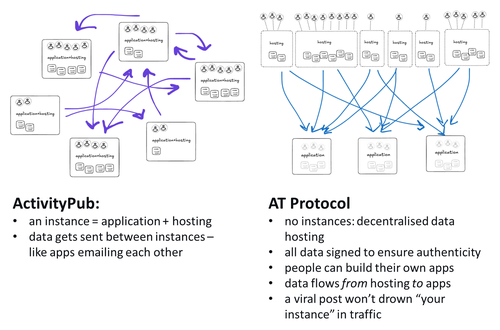
Derived from this Bluesky thread by @danabra.mov
Nostr & Farcaster
These both venture into blockchain territory. I'll be investigating these soon.
See also
- Tim Berners-Lee’s Solid, providing social media users with control over their data through personal knowledge graphs.
- adversarial interoperability - another part of the solution to this problem.
Personal state of play
ActivityPub
I was an early convert to ActivityPub as a theoretical idea, and in 2022 found myself writing a Fediverse strategy report for another EC department as the EU's Data Protection Supervisor and the EC's IT department launched social.network.europa.eu, the EU's own Mastodon server. The same year saw the EU Bubble's own server - https://eupolicy.social/ - launched. As I pointed out at the time, this had real potential: "it should be very easy for eupolicy.social to avoid creating a Brussels Bubble within the Fediverse... rather than building bridges outwards, we can pull national conversations into the Bubble, simply by following the right people." (Am I on the right Mastodon instance?).
At about the same time I took the plunge as part of the #TwitterMigration triggered by Elon Musk's purchase of Twitter. I was optimistic (my first post was literally Welcome to the Fediverse, starry-eyed noob), but within a few months I'd discovered an unhappy truth: the current infrastructure simply doesn't deliver content properly reliably.
I'd point you to the mid-2023 toot where I pointed this out, but (as if to illustrate my point) it's gone: in November my server simply disappeared, taking all my content and connections with it, without warning. I managed to dig out a screenshot of that toot from my phone and include it in All my toots gone.
Well before then the EU's experiments had become clearly underwhelming, with accounts limited to the institutions, rather than the people working in them. Someone clearly never read Euan Semple's "Organisations don't tweet, people do", missing a huge opportunity that news organisations started embracing in 2022: setting up a Fediverse server for their journalists to prove that they are their journalists, not an imposter. In April 2024 it was closed.
Meanwhile https://eupolicy.social/ was shrinking, from 720 active accounts soon after launch to 225 by late 2024.
From Threads to Bluesky...
Literally one month after my Mastodon server disappeared, Instagram's "Twitter-killer" Threads arrived in Europe, announcing their intention to join the Fediverse. I dug out my never-used Instagram account, and also launched a Bluesky account to kick both networks' tyres in parallel.
Currently I'm feeling confident about Bluesky, as set out in my November 2024 newsletter.
---
Version control
I develop this Fediverse Overview using the permanent versions pattern described in Two wiki authors and a blogger walk into a bar….
- changes in this version:
- updated to reflect what I learnt about Bluesky, and generally shortened
- version control
- this is version: 4
- previous versions available on my experimental wiki
---
More reading: resources tagged OR(#fediverse, #open web, #bluesky, #mastodon, #threads, #nostr) follow below:
Relevant resources

The Initiative for Digital Public Infrastructure's manifesto sets out the three legs upon which an open public sphere must rest.

A report from Ghost on ActivityPub integration, starting with a nice intro for newcomers: "HTML is a standard for displaying text and images on a computer. Email is a standard for sending and receiving messages privately. ActivityPub, then, is a standard for sending and receiving content publicly.", and followed by some musings on the difficulty o…

Michael Foster's "top ten unfinished building blocks" are:trust & safety: "heart of an ethical social web... [currently] delegated to a small group of volunteers... [but] green shoots emerging"spam filters: "there are some amazing tools now... Pixelfed has shown what can be done"safe spaces / bridging & federation: 2 closely linked challenges whic…

Anuj Ahooja asks, on Threads' first birthday, the "existential question... Why does Threads exist? ... an alternative to Elon Musk's X. But ... a platform can't exist to be "an alternative." It should be able to stand alone with its unique purpose and be built to incentivize users to follow that purpose... [unfortunately] the humans who have worke…

Casey first gets the Perplexity.ai scandal off his chest: "the Clearview AI of generative artificial intelligence companies: scraping billions of pieces of data without permission and daring courts to stop it. Like Clearview, Perplexity’s core innovation is ethical...".Is the Fediverse a solution? He likes it, but "a partial one... giving up on th…

"Threads will now let people like and see replies to their Threads posts that appear on other federated social media platforms... [but] you can’t reply to replies “yet,”". Meanwhile, Fediverse integration expands to another 100 countries "and hope to roll it out everywhere soon".

"Channels enable any user to create a curated feed with a mix of post type, hashtags, lists, filters and mutes. Customised timelines which anyone can post to via their app or web UI, or by using a dedicated hashtag or emoji."This exists already outside the Fediverse: "The Farcaster app, Warpcast, has a fully formed and fast growing set of channels…

Now that Threads has joined the Fediverse, "I can follow Threads users that opt-in to Fediverse integration through my Mastodon account" - Anuj's journey, which apparently exceeded expectations, despite - or perhaps because of - his many issues with Threads (which I share): defaulting to For You, an impoverished chroni feed, no lists and a very li…
"The indiscriminate proliferation of AI-generated content will not empower the underrepresented or democratise knowledge creation... [but] dilute and fragment the authenticity and reliability of information ... the discerning judgment of human curators is the only defence against misinformation and mediocrity".Why? Human curators :"bring nuanced u…

"A simple, open protocol that enables a truly censorship-resistant and global social network."They're clearly gunning for ActivityPub, with a secondary page entitled Why isn't Mastodon good enough? The key point made is that while Mastodon was OK when "server owners could be trusted to be cooperative, but it doesn't really address the crucial issu…
One of the snippets from a ZNLive interview I did in December 2023: "emerging social media platforms like Mastodon and Bluesky face a humorous yet real challenge - they're like "Twitter, but without your friends."With the European launch of Threads, the question arises: Can it offer a unique appeal to draw users? Will [they]... redefine social net…

Exactly one year after publishing Am I on the right Mastodon instance?, I discover that I wasn't. At least I got a good image out of ChatGPT for the occasion, for a change.

One of my favourite writers/thinkers on all things digital future is "finally, definitely, fully leaving X, and probably all social media..."

"the distributed/federated digital garden approach is the way to go for knowledge commoning... cribbing from ActivityPub's local, global, and 'those-you-follow' timelines... you could have local, 'those-you-follow', and global gardens... [with] some kind of liquid democracy", and interest-based groups, perhaps starting with user-defined lists: " …
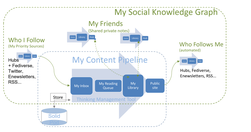
The second in my 1/1/2023 bundle of 5 posts exploring collective intelligence looks at the role of decentralised social networks: "A personalised, decentralised Social Knowledge Graph for each user multiplies the knowledge available to them via a trusted network of Followers and Friends, and creating collaborative possibilities more akin to wikis …
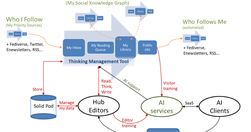
The "executive summary" of my 5-part bundle of 1/1/2023, which "provide a snapshot of my current thinking into how a decentralised collective intelligence ecosystem could be bootstrapped into existence."
"Micro.blog can now cross-post to a Mastodon user account... Your custom domain on Micro.blog can now be ActivityPub-compatible, so that you can follow and reply to Mastodon users directly on Micro.blog ... someone can follow your blog posts".As a result "you can consolidate your identity and posts back to your own blog at your own domain name..…
Yoyogi "breaks from the timeline... elevates the author and centers the thread".Pick a Fediverse account (Mastodon for now, Pleroma and Misskey next) that you’re following and see just their threads, in a columnar interface.You need to login and give it permission: the accounts you follow are presented at left, allowing you to select one. You can …
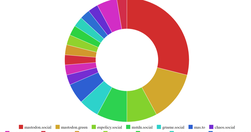
My second post following my personal #twittermigration: "the other users on your instance create its collective intelligence — the nearest thing you have to a content discovery algorithm".Not that I like algorithms, but "Apart from hashtags, ,,, your server’s Local and Federated timelines [are your] primary discovery channels when you’re getting s…

Mastodon is "subtly designed to reduce the huge, viral surges of attention we see on Twitter" and others, which have "deformed people’s behavior... coaxed people to constantly try to hack the attentional marketplace... incessantly making posts ... operatically theatrical... enrage ... [other] high-voltage reaction".Hence “antiviral design”, of whi…

"I wanted a way to add any bookmarks I make there into a 'Read later' category in my RSS reader ... I create a PHP file that gets the latest 20 bookmarks... and takes an access token from your mastodon 'development' admin page. Then I can give this URL to my RSS reader: https://neil.mckillop.org/stuff/mastodon_bookmarks.rss"- via https://glasgow.s…

"Welcome To Mastodon Welcome to Mastodon, and The Fediverse! This is a living document with some tips and Frequently Asked Questions about Mastodon and the Fediverse..."Pretty complete-looking

Awesome hot take open letter to Elon Musk: "You fucked up real good, kiddo... no possible way to grow ... without ... compromises that will ultimately destroy your reputation and possibly cause grievous damage to your other companies... the problems with Twitter are not engineering problems. They are political problems... absolute monarchs usuall…
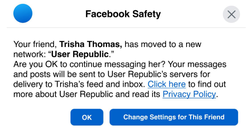
Those who've read Doctorow's books and blogs on the collective action problem stopping people leave the established social media walled gardens may not find anything new, except for the quite brilliant link he makes with "the 1971 film adaptation of Fiddler on the Roof ... the Anatevkans can’t just pack up and leave: they are being held hostage…by…
The story on Gab and Mastodon:"After crowdfunding millions of dollars... Gab abandoned its own code and switched to ... Mastodon software in early 2019 as a way of circumventing Google’s and Apple’s ban..."Mastodon's AGPLv3 opensource license allows this, of course, but there are conditions, which Gab then broke until JoinMastodon "sent a Cease & …

a "how-to guide ... through an online survey of Blind / low vision / visually impaired people."Discovered via Mastodon, where the culture is not to boost any toot containing non-accessible images, but applicable to all online publishing. "alt text and image descriptions are ... not actually the same thing. Alt text refers to the text specifically …

A very funny round up from week 2 of the twitter migration: "It hasn’t even been two weeks since Elon Musk officially took over Twitter, and things look like they’re going about as well as a Cybertruck demonstration... one response to Musk’s tenure has seemed to really get under his skin: the verified impersonators."Funny, but the number of satiri…
"a guide & a general backgrounder/crash course on data protection law... primarily targeted at Mastodon instance owners ... and users, but much of the elements will likely also apply to other #fediverse services" by "an External Data Protection Consultant, researcher, and general buzzkill who focuses on helping organisations and individuals unders…
Relevant Overviews
- Bluesky and the ATmosphere
- Content Strategy
- Fediverse
- Online Strategy
- Online Community Management
- Social Media Strategy
- Content Creation & Marketing
- Digital Transformation
- Thinking tools
- Personal Productivity
- Innovation Strategy
- Surveillance Capitalism, Social media and Polarisation (Overview)
- Communications Tactics
- Social Web
- Media
- Politics
- Communications Strategy
- Science&Technology
- Business